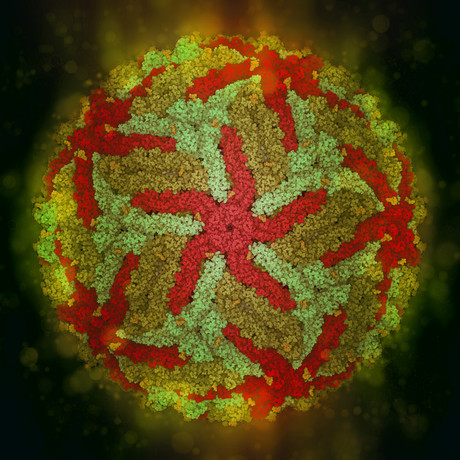Aussie zika vaccine begins US trial

The first non-human primate trials of a dual vaccine developed in Australia for the zika and chikungunya viruses are about to begin in the United States.
The Sementis Copenhagen Vector (SCV) vaccine has been created by a team of researchers at the University of South Australia, in collaboration with Sementis Limited and the QIMR Berghofer Medical Research Institute.
The vaccine will be evaluated at the US Government National Institute of Health’s Institute of Allergy and Infectious Diseases (NIAID) laboratories.
Leader of the University of South Australia’s research team Professor John Hayball said the monkeys in the National Institute of Health’s sponsored trial would likely be vaccinated this week and then challenged with an authentic zika virus in about 70 days.
Blood samples from the primates will then be sent to Australia to test the vaccine’s ability top protect against chikungunya.
“By combining it with the chikungunya vaccine it’s basically a one-shot vaccine that will provide durable responses to both of those and there’s a real novelty to that — we are not aware of any other type of approach to making a dual-specificity vaccine,” Professor Hayball said.
Zika is suspected of causing birth defects and caused global panic in 2015 when it was detected in more than 20 countries in the Americas including Brazil, Colombia and Mexico. Chikungunya is a viral disease transmitted to humans by infected mosquitoes. It causes fever and severe joint pain. Other symptoms include muscle pain, headache, nausea, fatigue and rash. Zika virus is spread by the same group of mosquitoes that spread the Dengue viruses and chikungunya virus.
The new approach has taken the world’s first and most successful vaccine against small pox — genetically altered it to improve its safety and efficacy — and created a new vaccine platform able to deliver multiple antigens to guard against serious infectious diseases.
The SCV vaccine has been tested in preclinical proof of concept studies and been shown to provide protection against Chikungunya infection and its virus-induced complications and Zika virus — importantly preventing transmission of the virus to the foetus in pregnancy and also persistent infection of the testes.
The results of the research have been published today in the prestigious journal, Nature Communications.
Professor Hayball said the primate trials in the United States would give the vaccine a “huge amount of kudos” ahead of human clinical trials.
“We are talking clinical trials in 2018 or 2019 that‘s what we’re planning for,” he said.
“Everyone jumped on the (zika) bandwagon — as we did — two years ago and a series of different platforms have gone forward so it’s going to be interesting to see who comes out on top.
“We think we have a huge advantage because we have a manufacturing pathway built in to the platform technology and we know we can mass produce this vaccine economically.”
The SCV vaccine was produced using Chinese Hamster Ovary (CHO) cells, as are all Sementis’ SCV-based vaccines, which are routinely used for large scale manufacturing of biopharmaceuticals.
Professor Hayball said the company was also developing a number of other vaccines including a combined Hepatitis A/Hepatitis B single shot vaccine, which is being funded by the Australian Research Council.
“We don’t yet know what the holding capacity of this delivery system is — we’ve shown it works with two unrelated antigen cassettes against two different pathogens but we don’t what it’s limit could be — maybe we could put three, four, five, six or 10,” he said.
“We’re really excited about this, we kind of feel like we’ve crossed a bridge now with the non-human primate study and we’re getting a lot of interest and it’s fantastic.
“It’s hard to say but if we can safety and some efficacy studies in humans in humans within 12 to 24 months we would be rapt.”
Sementis Chairman Maurice O’Shannassy said production of a viral vectored vaccine in a CHO cell substrate was a game-changer in terms of the improved economics of vaccine production and providing vaccines on a global scale.
“Previous vaccinia-based vaccine vector systems have used chicken embryo fibroblasts for manufacture, which is associated with a number of manufacturing and safety issues,” he said.
“Being able to manufacture a vectored vaccine using CHO cells is a world first and offers a number of advantages in the event of an outbreak, including rapid manufacture scale-up and cold chain (refrigeration) independent distribution capacity.”
The University of South Australia is one of three long-standing public universities South Australia’s capital Adelaide along with Flinders University and the University of Adelaide, each of which are consistently rated highly in the international higher education rankings.
Source: The Lead South Australia
Originally published here.
European Space Agency inaugurates deep space antenna in WA
The ESA has expanded its capability to communicate with scientific, exploration and space safety...
Black hole collision supports Hawking's landmark theory
Astrophysicists have witnessed a collision between two black holes that was so loud, they were...
Uncovering differences in wild and domesticated crops
Researchers have revealed insights into the genetic make-up of wild varieties of common crops...





